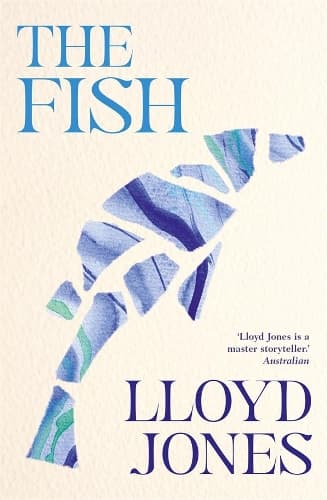Review: The Fish
Reviewed by Angelique Kasmara
One of Aotearoa New Zealand’s best known and celebrated writers, Lloyd Jones, has a new book out, the conceptually curious The Fish. Jones’s oeuvre includes The Book of Fame, Hand Me Down World and Mr Pip, which was the recipient of numerous awards and also shortlisted for the Man Booker Prize. The Fish deals with the ‘outsider’ experience, like much of his previous work. It has the allegorical feel of The Cage as well but is also very much grounded in 1950s and 1960s New Zealand.
The Fish of the title is a hybrid creature, more marine than mammal, born into a human family. There’s an unstated acceptance from the beginning but also feelings of revulsion and guilt: “His mouth constantly gulps inside rubbery lips. At the fish shop we place him in the window display, then we look away ashamed of ourselves at what we have thought.”
Its lean 228 pages are packed with drama and tragedy and even includes a historical figure, the late Prime Minister Norman Kirk (there’s a wonderfully terse line at the end of that chapter about the Fish’s family meeting the great man: “There is some discussion about the chocolate wheatens. Mum thought the biscuits could have used a freshening up.”). The sinking of the Wahine is also sewn into the plot.
A bleakness pervades the entire narrative. The passages where the family visit an abandoned caravan, a pitiful legacy from a loved one, are wrenching in their detail. Its characters often go through significant incidents without speaking a single word: “The hard silence of the tent that night is transferred to the car on the long drive home. Two days later Dad comes home early from work. His surprise for the Fish is parked on the doorstep, freshly welded with parts recycled from the yard. A bike. A bike for our Fish.”
Some inconsistencies (the timeline doesn’t quite match the protagonists’ ages in several places) and a few anachronisms led me to speculate if the narrator is a classic ‘unreliable’ one. Other stylistic oddities mark the text: the narrator’s name is never mentioned nor is his sister who is the one to birth the Fish. She’s known instead as the ‘Fish’s mother.’ On the other hand, his other sister, Carla, is regularly referred to by her name and we learn quickly that the Fish is named after his dad, Colin Montgomery.
Despite being astonishing in the water (“the same limbs turn into fins as his body torpedoes from one end of the school pool to the other”), the Fish spends more time on land. Wisely, as it transpires, because where there is water, tragedy is not far behind.
The motif of absence occurs in several key characters that are referred to often but are rarely present on the page, whether by geography or (it’s assumed) their untimely death, and in the withholding of information. Early on, the narrator realises that as a child, he was never told many things. “I flick the pages of an American magazine and stop at an ad for ‘skin whitening’. I don’t question it. I don’t think anything of it. Yet out of all the litter of the past I have not forgotten this moment. It has bided its time to wait for me to catch up to what ‘skin whitening’ might represent in a world that, so far, looks like me, with a few variations, which my adolescent mind blindly accepts as the approved grain of the world.”
Much later in the book, it dawns on him that, “It is too late to ask her those questions to which only she knows the answers. The Fish’s father. Who was he? And why did they not go to the police?”
How you respond to The Fish may depend on whether or not you love the bold and experimental stylistic choices: this reader found these distracting rather than illuminating.
Reviewed by Angelique Kasmara
